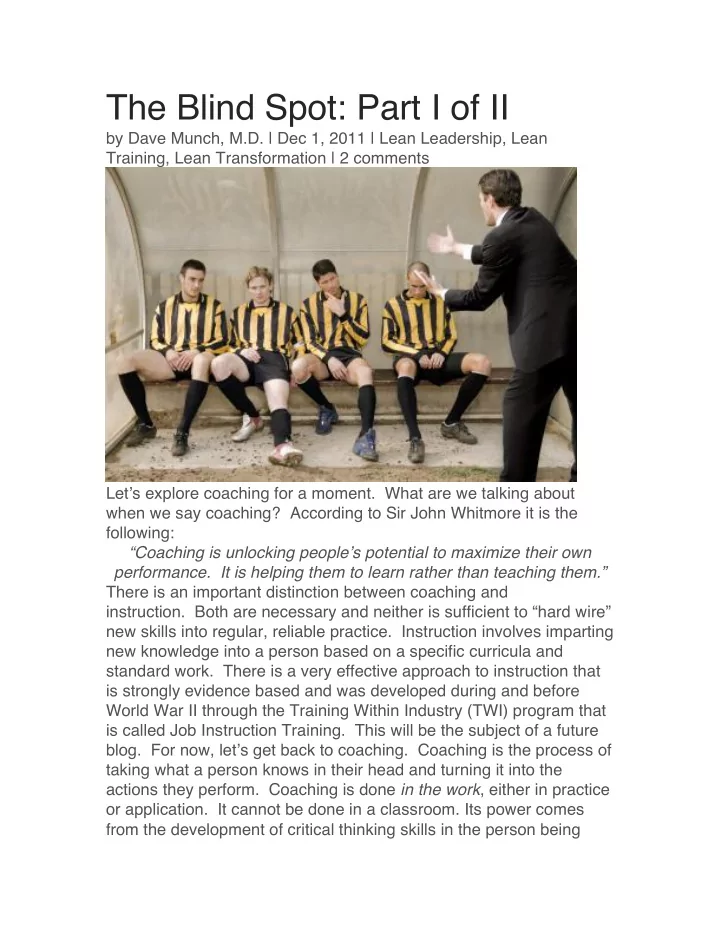

The Blind Spot: Part I of II by Dave Munch, M.D. | Dec 1, 2011 | Lean Leadership, Lean Training, Lean Transformation | 2 comments Let’s explore coaching for a moment. What are we talking about when we say coaching? According to Sir John Whitmore it is the following: “Coaching is unlocking people’s potential to maximize their own performance. It is helping them to learn rather than teaching them.” There is an important distinction between coaching and instruction. Both are necessary and neither is sufficient to “hard wire” new skills into regular, reliable practice. Instruction involves imparting new knowledge into a person based on a specific curricula and standard work. There is a very effective approach to instruction that is strongly evidence based and was developed during and before World War II through the Training Within Industry (TWI) program that is called Job Instruction Training. This will be the subject of a future blog. For now, let’s get back to coaching. Coaching is the process of taking what a person knows in their head and turning it into the actions they perform. Coaching is done in the work , either in practice or application. It cannot be done in a classroom. Its power comes from the development of critical thinking skills in the person being
coached, the coachee. The most effective approach to coaching is the Socratic method, asking questions. The coach’s job is to ask the right question not give the answer, even if it is the right answer. Asking a question forces the other party to think. Telling someone what to do requires no thinking, just compliance. When you do this you deny the other person the opportunity to contribute and it establishes you as the keeper of knowledge and answers. They don’t have to think because you will do that for them. Unfortunately you immediately become the bottleneck and can quickly be overwhelmed by all of the ideas you must distribute based on the complexity of the work. It is better to develop a team of thinkers that can share the burden and contribute to the problem solving that is so critical in our complex settings. Good coaching is not just about asking questions, it’s about asking the right questions. The right question is a powerful question that prompts thinking. It typically starts with what, why or how . A weak question is one that can be responded to with a yes or no answer. It typically starts with does or will . For example, if you are trying to improve your hand washing practices in your hospital you could approach this in three ways: 1 You could tell the person to wash his or her hands next time. That will be a temporary fix at best. 2 You could ask the person “Will you wash your hands next time?” That will be met with a “yes” and similar temporary success. 3 If, however, you were to ask the question “What got in the way of you washing your hands?” you are likely to prompt some level of thinking and reflection that can lead to the discover of a barrier that can be addressed like; “The hand-washing pumps are not close to the work flow and it is a hassle to find them.” or, “I wasn’t planning on touching the patient.” Both of these allow for a dialogue to fix a barrier or to provide more insight into the hand washing practices. It is much easier and seemingly less time to just tell someone what to do. The problem is that it is not effective, at least long term. Caregivers have been trained to give answers, over and over again. It will be hard to break these habits but well worth the effort. In the next blog, we will cover the 5 characteristics of effective
coaching in part II of this two part series. This week’s blog was written by Dave Munch, M.D. and HPP Senior Vice President and Chief Clinical Officer Dave oversees all of HPP’s clinical and Lean Healthcare engagements. He plays a lead role in new services development and HPP’s continuous adaptation to the healthcare industry’s ever- changing needs. Dave previously served at Exempla Lutheran Medical Center as their Chief Clinical and Quality Officer. Dave has served on the Agency for Healthcare Research and Quality’s High Reliability Advisory Group, has an extensive background in hospital operations, health plan governance, physician organization governance and clinical practice in Internal Medicine. Dave received his M.D. from the University of Colorado’s Health Sciences Center. He is also a faculty member for the Belmont University Lean Healthcare Certificate Program. Photo Credit Polka Dot Images/Polka Dot/Getty Images .entry-content You can start editing here.
Recommend
More recommend